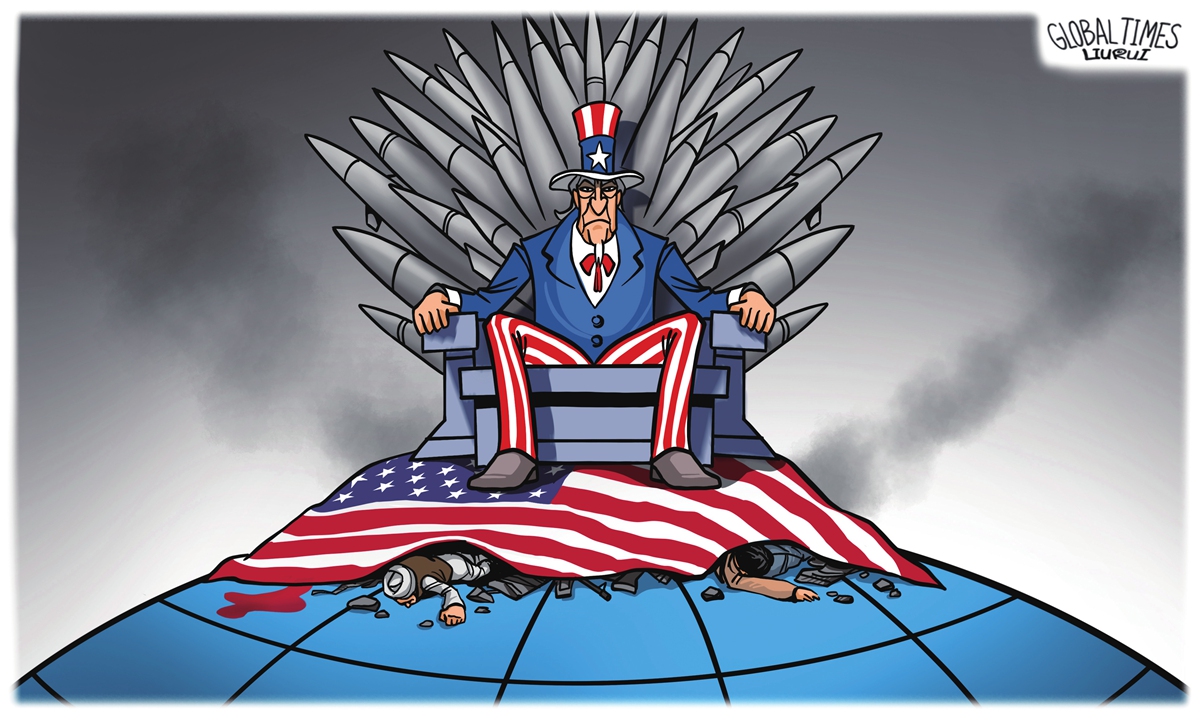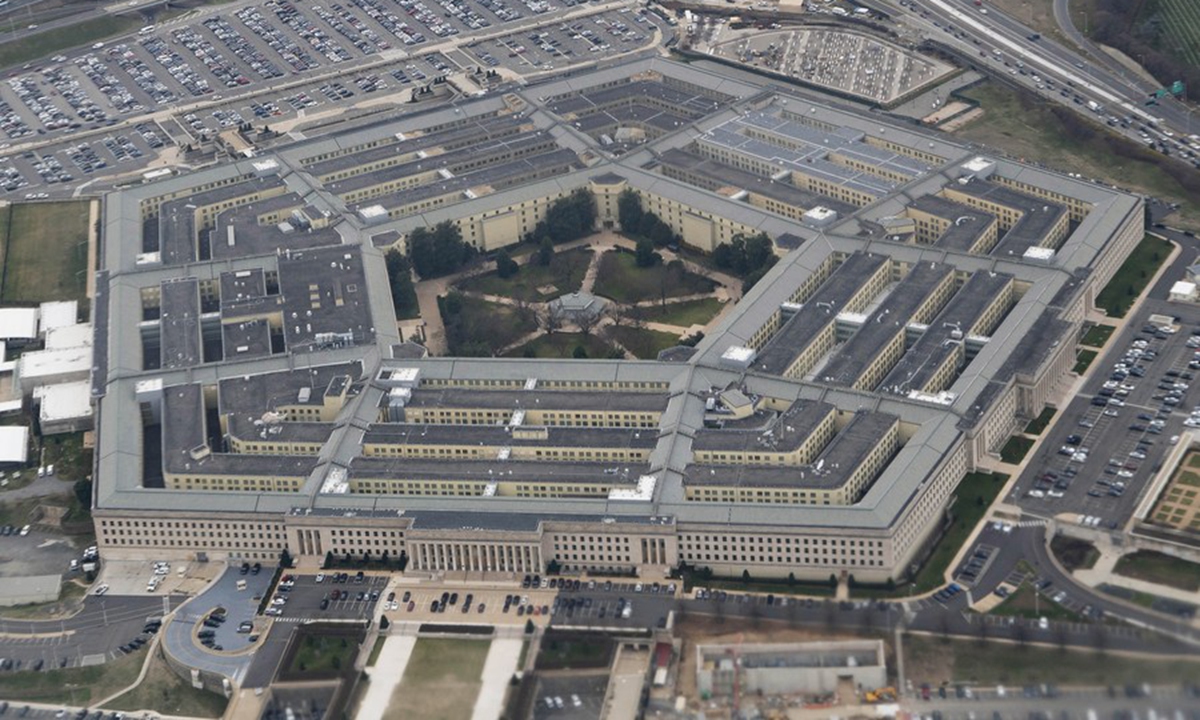
House of Hegemony Illustration: Liu Rui/GT
Hyping the increasing "security challenge" and "threats" from China, the Pentagon released the Biden administration's national defense strategy on Thursday, which Chinese experts viewed as a product of fear and filled with Cold War mentality that damages world peace and stability.
Although the US has shown a strong willingness to contain China, or launch "competition" as it is referred to in the report, its own power is not strong enough to support its tough rhetoric, and that makes the guideline-like strategy relatively empty, experts said.
The 80-page, unclassified report comes about two weeks after the release of the Biden administration's first formal national security strategy, which has been
slammed by the Chinese Foreign Ministry for describing China as "America's most consequential geopolitical challenge." That same rhetoric is continued in the Pentagon's report, which described China as the "most comprehensive and serious challenge to US national security" that will determine how the US military is equipped and shaped for the future.
Unlike China, which poses a "pacing challenge" to the US, according to the defense strategy, Russia was portrayed as an "acute threat."
The release of the US National Defense Strategy came along with two other Pentagon reports, namely the Nuclear Posture Review and Missile Defense Review, which claimed there was a "longstanding nuclear challenge" from China and Russia's growing arsenal, according a CNN report.
Ironically, however, the AP said the core meaning of the report is the concept of "integrated deterrence", which means that the US "will use a broad combination of military might, economic and diplomatic pressures, and strong alliances - including America's nuclear arsenal - to dissuade an enemy."
Chinese Foreign Ministry spokesperson Wang Wenbin responded at a press briefing on Friday by saying that as the country with the largest nuclear arsenal, the US hypes up major-power competition and bloc confrontation with a Cold War mentality. He added that using nuclear weapons as a tool to advance its geopolitical agenda runs counter to the world's desire to prevent a nuclear war or nuclear arms race.
"The US policy reflects its hegemonic logic of seeking absolute military superiority and will stoke a nuclear arms race," Wang said, "The US has strengthened the role of nuclear weapons in its national security policy and lowered the threshold for their use, which has increasingly become the source of the risk of nuclear conflict."

Photo taken on Feb. 19, 2020 shows the Pentagon seen from an airplane over Washington D.C., the United States. Photo: Xinhua
Waning hegemony
According to some military experts, the Pentagon's report seems to show off that the US has evaluated the change in the form of new technology under battlefield conditions, formed a multi-domain battle space mode and diversification of military construction.
"The Pentagon is trying to say that the concept of 'integrated deterrence' has entered the actual combat level, the essence of which is to build the war capability and operation mode of civil-military integration, nuclear and conventional weapons integration, and the integration of offense and defense by integrating resources at home and courting allies abroad," Zhuo Hua, an international affairs expert at the School of International Relations and Diplomacy of Beijing Foreign Studies University, told the Global Times on Friday.
However, it should be noted that the latest National Defense Strategy from the Pentagon views China as a source of a security threat to the US homeland, which is unprecedented, Zhuo said.
In the Pentagon's report, "defending the homeland, paced to the growing multi-domain threat posed by China" was listed as one of the top-level defense priorities. The word "homeland" is mentioned 35 times, and there's one paragraph titled "Threats to the US Homeland."
According to the Global Times reporter's statistics, China or PRC appeared 101 times in total, while Russia appeared 89 times. Other key words such as "defense," "security," "challenge" and "threat" appeared 539 times in total in the 80-page report.
"China has no interest in stepping into the boxing ring with the US. We will do things at our own pace. China will never occupy Alaska or deploy missiles close to the US. In China's view, it's meaningless for the US to try to maintain military hegemony in the Asia-Pacific across the vast Pacific Ocean," Lü Xiang, a research fellow at the Chinese Academy of Social Sciences, told the Global Times on Friday.
While China's development is not in any way directed against the US, the increased presence of China in the Pentagon's report indicates that there is serious concern and even fear in Washington about China's possible overtaking of the US in national strength, Lü noted.
Shen Yi, a professor at the School of International Relations and Public Affairs of Fudan University, shared his concerns that the US may act more insidiously and erratically in the future. He told the Global Times on Friday that the US will not tolerate any country catching up to or surpassing it in any way, especially in the context of its declining power.
However, in sharp contrast to the US' recent hyping of the Chinese mainland seeking to speed up the "seizing" of Taiwan island by force and accusing it of changing the cross-Straits status quo, the word Taiwan only appeared four times in the report, including once when it said that the US will support the island authorities' "asymmetric self-defense countermeasures."
Skipping over the Taiwan question would suggest that the US has realized that it is no longer strong enough to back up its tough rhetoric, Lü said.
Moreover, China's ability and intention to defend its national interests are becoming stronger and stronger. In the event of a war across the Taiwan Straits, the US will not be able to exercise the kind of influence it expects to unless the US government becomes completely adventurist one day, he added.
"By defining its relationship with other nuclear-armed states in terms of competition rather than cooperation and dialogue, the US will become increasingly passive, especially when it turned out that NATO members aren't all that united in their conflict with Russia," the expert said. "If the US wants NATO to get involved in a possible conflict with China over the Taiwan question, it will only lead to the disintegration of the alliance," he added.
China is one of the biggest contributors to global stability, and by treating China as a "threat," the US is wasting its resources where they are least likely to be used, he said.





